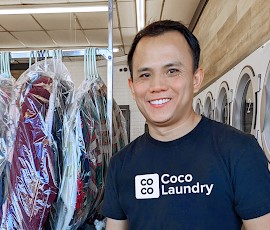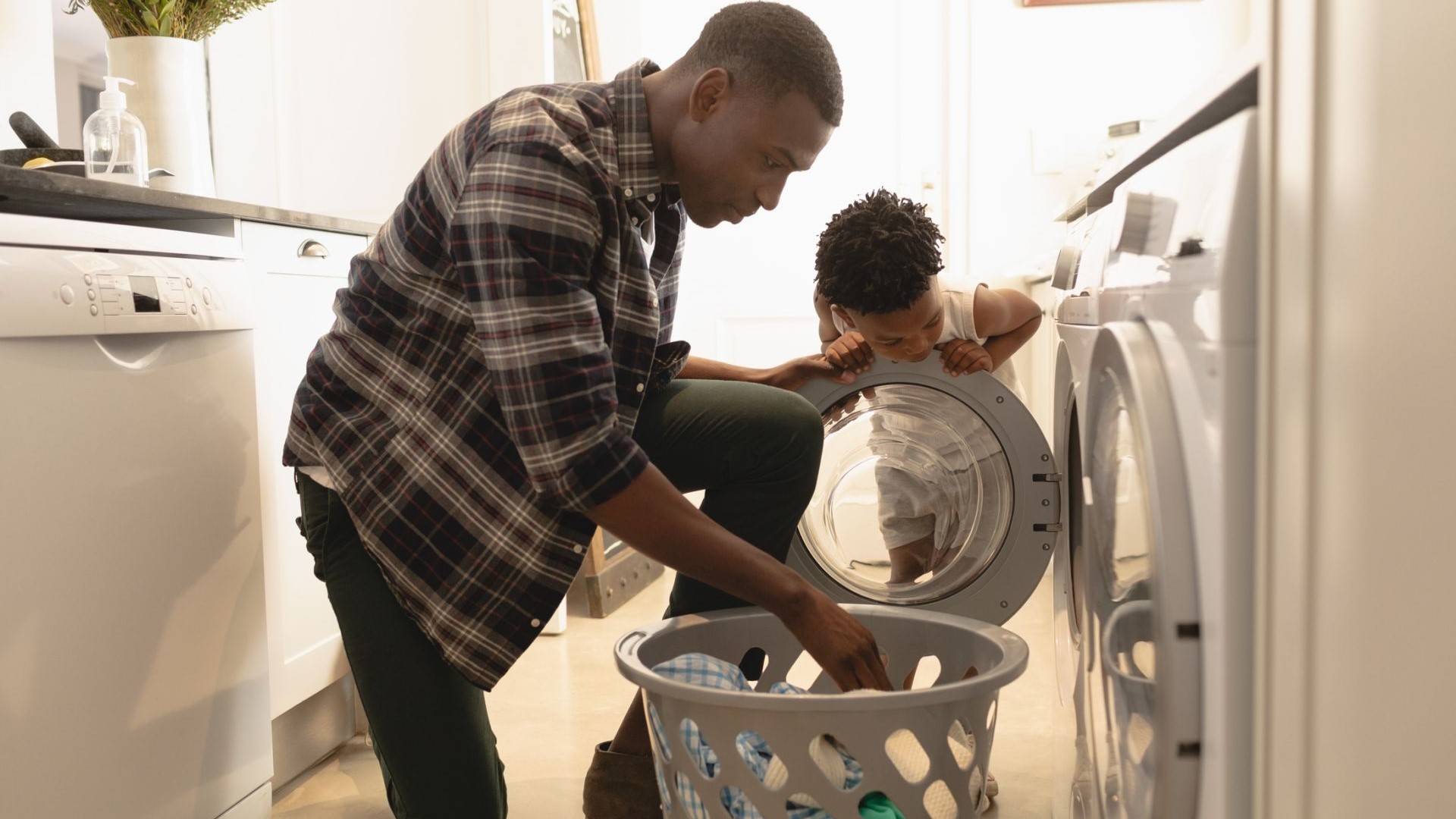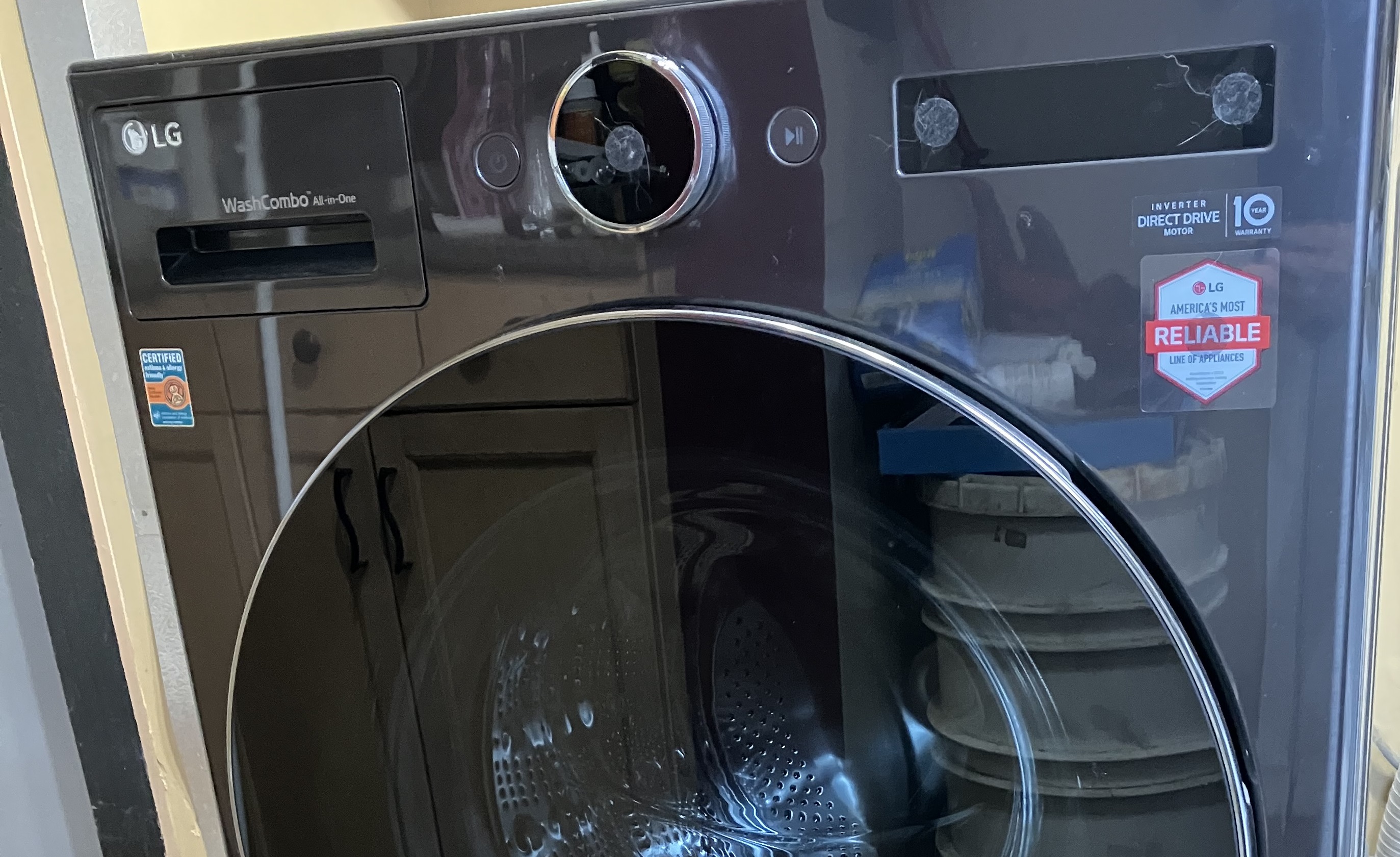A washer dryer combo can be a game-changer for many households. These all-in-one appliances combine the functionality of a washing machine and a dryer into a single unit, saving you valuable space in your laundry room, basement or garage. Some will also save you the effort of removing your laundry from one drum and placing it into another, as they combine washing and drying technology in a single drum, while others will feature two drums stacked together.
What’s more, features such as automatic dispensers, delayed timers, smart features, and energy efficiency settings can save even more time and effort and cut your household bills.
However, with so many available options, choosing the best washer dryer combo can feel daunting. I’ve spoken to a couple of laundry experts to get their insight and advice on what you should look for in your new washer dryer combo (as well as a sneaky insider’s tip to reduce noise and vibration).
How to choose a washer dryer combo
1. Consider your budget
How much you can afford is likely to be the primary factor influencing your choice of washer dryer. These appliances can range from budget-friendly models (such as the Deco 1.62 cu. ft. All-in-One Washer Dryer Combo for $1099 at Home Depot) to high-end, feature-packed units (like the LG SIGNATURE Smart wi-fi Enabled Washer/Dryer Combo for $3,199). When setting your budget, consider the following:
- Initial cost: Decide the maximum amount you're willing to spend.
- Long-term costs: Factor in any potential energy and water savings you might benefit from if you spend a little more on an appliance with energy-saving features
- Maintenance and repair costs: Consider the cost of potential repairs and maintenance over the life of the appliance and whether it’s worth shelling out a little more on an extended warranty.
“Our more affluent clients usually pick a washer dryer that matches the overall aesthetic and color of their laundry room,” says Delah Gomasi, a cleaning expert and founder of MaidForYou. “They usually spare no costs in making sure that the appliances in their household match the look and feel of their room. Whereas clients on a budget usually opt for what is more energy-efficient. So it always depends on the buyer's individual budget and what they value in a washer dryer.”
While opting for the cheapest option may be tempting, investing in a higher-quality model can often lead to better performance, energy efficiency, and longevity. Look for the best value within your price range, balancing features, capacity, and energy efficiency. However, bear in mind that some premium features, such as Wi-Fi connectivity and vibration reduction technology, may be out of reach, depending on your budget.

CEO & Director of MaidForYou, Delah bootstrapped his business from scratch and became a professional cleaner in the process. He loves all things business and finding out the latest and greatest in cleaning trends, cleaning equipment, tools and technology.
2. How much capacity do you need?
The capacity of a washer dryer is crucial in determining how suitable it is for your household.
I spoke to laundry expert Ocean Van, owner of Coco Laundry in Long Beach, California, to find out more. “Size and capacity are key,” says Van. “Standard machines generally come in widths of 27 to 30 inches, with compact models at 24 inches for tight spaces. Large-capacity washers (up to 6.0 cu. ft.) are ideal for large families with frequent laundry loads, while smaller households may find 2.0 to 3.5 cu. ft. models sufficient.”
Van suggests making sure your dryer has approximately 1.5 times the cubic footage of your washer to effectively accommodate the laundry from each wash cycle.
Think about your laundry habits, too. Even if you have a small household, you may prefer to wait and do one large load of laundry at the weekend when you have more time. In this case, you might plump for a higher-capacity model. Or, if you have pets, you may have lots of blankets and beds to wash frequently, so a larger drum will help.

Ocean Van is owner of Coco Laundry, a laundry service provider in Long Beach, CA. He has years of experience in making clothes, garments and linen smell good, as requested by both residential and commercial (especially hospitality) customers.
3. Factor in the warranty
“A comprehensive warranty is ideal,” says Van. “Look for warranties covering at least one year of parts and labor. Some manufacturers offer extended warranties up to 10 years for major components like the motor or drum.” And remember - a longer warranty period is a good sign that your brand has confidence in their product's durability and reliability. Here are some tips on getting the most out of your warranty:
- Look for at least a 1-year warranty on parts and labor.
- Check if extended warranties are available and assess their value.
- Research your chosen manufacturer's reputation for honoring warranties and providing good customer support.
- Consider the availability of local repair services for the brand you choose.

4. Decide what your ‘essential features’ are
Washer dryer features can vary significantly between models and brands. Some key features to consider include:
- Washing cycles: Look for a variety of cycles to handle different fabric types and soil levels.
- Drying options: Ensure the dryer function offers enough settings for your needs.
- Temperature controls: Adjustable water and drying temperatures allow for better fabric care.
- Spin speed: Higher spin speeds can reduce your drying time.
- Delayed starts: If you don’t want fresh laundry moldering away in the washer dryer combo while you’re out at work, this allows you to set the machine to start at a convenient time.
- Child lock: If you have small children in the house this can be an essential safety feature to consider.
- Automatic dispensers: Some models offer built-in dispensers for detergent and fabric softener.
High-end models with bigger price tags often offer premium features like automatic washing and drying, steam cleaning, wi-fi connectivity for remote control, and advanced sensor technology. Have a think about which features are must-haves for your household and which ones you can live without to help narrow down your options.
5. What about energy efficiency?
Energy efficiency isn’t just about being environmentally conscious; it can also lead to significant water and electricity bill savings over time. And with utility bills rising, there’s no better time to invest in a new appliance that can help you save money. During your research:
- Look for Energy Star certification, which show how much your new appliance meets strict energy efficiency guidelines.
- Check the energy rating label for estimated annual energy consumption.
- Consider models with eco-friendly features like load sensing, which adjusts how much water is used based on your laundry load.
- Look for more efficient drying technology, such as heat pump dryers, which use significantly less energy than traditional condenser dryers.
While more energy-efficient models may have a higher upfront cost, the long-term savings they come with can make them a great investment for your wallet. “High-efficiency (HE) washers are designed to use less water, which is great for the environment and your water bill,” Van told Top Ten Reviews.
“They use advanced wash technologies, such as sensors and low-water settings, to reduce water consumption while still providing effective cleaning. For households with high water usage, I’d recommend a HE model.”
6. Look at user reviews
Real-life experiences and reviews from other users can give you unlimited insight into how your chosen washer dryer combo might perform, as well as how reliable it is and how the brand treats customers after they purchase. When reading user reviews:
- Look for reviews from verified purchasers.
- Pay attention to comments about reliability, cleaning performance, and drying efficiency.
- Consider both positive and negative reviews to get a balanced perspective.
- Look for reviews from users with similar household sizes and laundry needs to yours.
Remember that while user reviews can be helpful, they should be just one factor in your decision-making process.
7. Consider brand reputation and customer service
The reputation of your chosen brand and the quality of their customer service can make a big difference to how satisfied you’ll be with your choice. Have a look at:
- The brand's overall reputation in the appliance industry.
- Their customer service ratings and their responsiveness to issues.
- Availability of replacement parts and authorized repair services.
A reputable brand with good customer service can make a significant difference if you encounter any issues with your washer dryer.

8. Think about noise levels and vibration
The noise level of a washer dryer can be crucial, especially if your appliance is near living or sleeping areas, if you work from home, or if you have young children. Even if you do your laundry in the evenings, it’s worth checking out how noisy it might be while you’re trying to catch up on your favorite TV shows or getting some much-needed shut-eye. Here are a few tips that can help:
- Check the decibel ratings for both the washing and drying cycles. Van suggests 75dB is the best for the quietest operation.
- Look for models with vibration-reduction technology, including insulated drums and quieter motors.
- Read user reviews that mention noise levels.
- Consider where you'll place the appliance and how any noise might impact you, your family members, or any close neighbors.
Some high-end models offer ultra-quiet operation, which can be worth the investment if noise is a significant concern. Gomasi told us that many cheaper models can only be quietened during operation by placing them on foam mats, and even then, it only slightly reduces the noise. But that’s a quick and cheap tip that could help if your budget won’t stretch.
9. Check installation requirements
Before making your final decision, it’s essential to ensure the washer dryer you're considering is compatible with your home's setup, so:
- Check the dimensions to ensure it will fit in your designated space.
- Make sure you have the necessary electrical and plumbing connections.
- Consider if you need a vented or ventless model, depending on your home's configuration.
Vented dryers rely on an external wall vent to expel hot air and moisture. If your home lacks suitable wall access, you’ll need a ventless dryer. While vented dryers typically dry clothes more quickly and have a lower initial cost, ventless dryers often boast superior energy efficiency, leading to greater long-term savings on utility bills. When choosing between the two, consider your home's layout, initial budget, and long-term energy costs to determine which option best suits your needs.
Remember, the goal is to find a balance between functionality, efficiency, and value that matches your specific budget. By thoroughly researching your options and prioritizing factors that are most important to your household, you can find a washer dryer that will meet your laundry needs for years to come. In the meantime, find out how long wet laundry can stay in the washer before it starts to smell.

